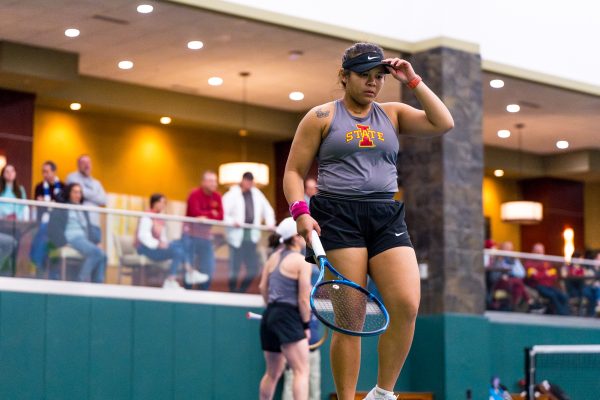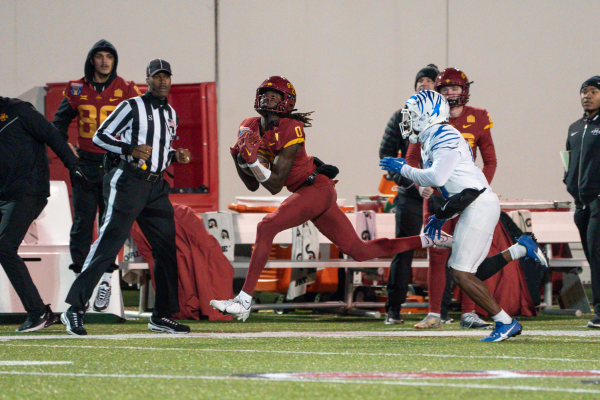Take a look around before reading
August 24, 2000
There is an epidemic that has spread itself through sports. Searching eyes. Incredulous glances. And to think you may have never even noticed the problem. Paranoia runs rampant now in sports. It is done in the name of The Competitive Edge. Many athletes and coaches are paid big bucks to do what they do. And winning is the road to bigger bucks. To win, you have to find “the edge.” To find “the edge” you have to do homework. Extensive homework. But is studying all of these mannerisms of the opposition worth it? At the end of the day, is it silly to worry about lip-readers? Why pitchers and catchers talk between gloves about a pitch 66 feet away when the sign of the pitch is no more than three feet away from the batter is beyond me. I will never understand why offensive coordinators throw the play sheet before their mouths while relaying the play when a techie could just as easily tap into the necessary line to give the 31 Dive to the opponent. Why are sports now filled with people who have the mindset of a ’60s hippie activist? Do these people really not trust anyone over 30? Lyle Smith is the head coach of the ISU men’s baseball team. He believes the art of paranoia plays a “significant” role in baseball. “If the third-base coach is tipped off about a pitch, that gives the batter a huge advantage,” Smith said. In the Big 12, filming the baseball games is allowed. And if a mannerism of a player or coach is exposed, it can also be exploited. “If a team can [decipher] what signal was used when they [opposition] ran the hit-and-run, that is a big help,” he said. And what of the catchers and pitchers with gloves over their mouths? “In the majors, you may have 35,000 or 40,000 people in the stands. To hear each other, you don’t want to make it obvious when you say `t-h-r-o-w t-h-e c-u-r-v-e-b-a-l-l.'” Maybe Smith is right. But baseball is also the sport that houses Leo Mazzone, the Atlanta Braves pitching coach who rocks so incessantly during games that any shot of him over three seconds makes 61.3 percent of viewers tired. Terry Carroll is on the other end of the spectrum. Carroll is an assistant coach of the ISU men’s basketball team. He doesn’t align himself with the back watchers of the world. “We try and take care of the things that we can take care of,” Carroll says. Eustachy and the rest of the staff tell themselves and their players to control the things that they can control and forget about the refs and other intangibles. “They may know one in 10 or two in 10 things about us, but if we are able to do things consistently well, we are going to be successful,” Carroll said. But don’t think that all basketball coaches are cool and collected. Frank Layman, former coach of the Utah Jazz, once asked for a glass of water from the waterboy during a game. When the boy handed it to Layman, Layman asked him to “drink it first.” “How do I know somebody didn’t put something in it?” he asked. “It’s a tactic,” said ISU hockey Head Coach Al Murdoch. “If I ask to talk to the officials, the other coach is going to want to hear it too. Sometimes I’ll just be talking about nothing, and the other coach will miss telling his team something.” Murdoch believes mind games can become waiting games. He goes on to say that sometimes a coach wants to talk to an official, but he wants to wait until the other coach leaves the ice. The opposing coach may know this and stick around and nothing will be accomplished besides waiting to see what the other guy will do. As Murdoch hinted, maybe it isn’t paranoia that these coaches hold, but wisdom gained over the years. “All sports are different,” says Smith. “Why did Hayden Fry paint the opposing locker rooms pink?” All together now: TO GAIN A COMPETITIVE EDGE. In this age of modern sports where research and scouting are placed on the highest pedestal, where teams know tendencies in different situations of nearly every player they face, doesn’t it seem trivial to worry about subtle gestures and raised eyebrows? Even Smith conceded “90 percent of games are won on talent.” But many fans themselves believe mind games are a part of sport. To that I say `Oh brother.’ Or should I say `Oh Big Brother.’
















